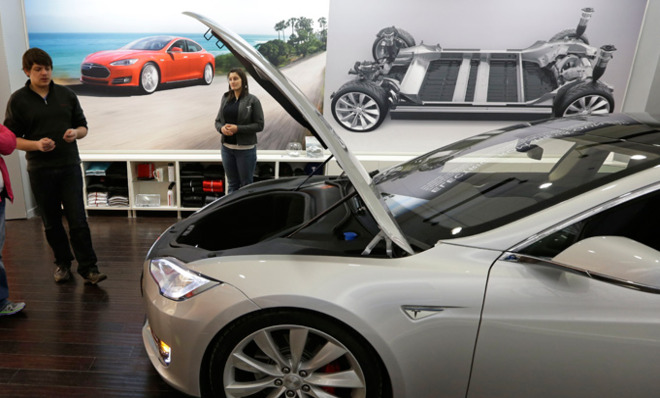4 smart takes on the showdown between Tesla and car dealers
Tesla's direct-sale business model is coming under fire in New Jersey and many other states

A free daily email with the biggest news stories of the day – and the best features from TheWeek.com
You are now subscribed
Your newsletter sign-up was successful
Tesla is becoming an auto non grata, said Marcus Wohlsen at Wired. New Jersey is "trying to shut the electric-car maker down before it ever gains traction." State officials have raised a stink over the company's direct-sale business model, claiming it violates a state law requiring companies to sell cars through certified dealerships. "Unlike typical car dealerships, Tesla showrooms aren't surrounded by parking lots filled with vehicles and high-pressure salesmen trying to get you to drive off in one." Instead, Tesla customers visit a showroom — typically in a mall — where they can "examine a floor model, learn about the design and engineering process, and schedule a test drive." Customers then go home, where they can purchase a car online, directly from the manufacturer. That is, of course, "the way retail should work." But "car dealers and their political cronies" are having none of it, fearing that "car shoppers might start to ask why the process of buying a car from the old guard has to be so lame."
It's not just New Jersey, said Jad Mouawad in The New York Times. The high-end automaker faced similar bans in Texas, Virginia, and Arizona, which have already "effectively shut down Tesla." Ohio is considering a bill that would impose similar restrictions on carmakers, and New York may do the same. "To Tesla, the challenges are nothing more than the actions of an entrenched and politically connected industry unwilling to consider new ways of doing business." But dealers say allowing direct sales "would harm consumers, limiting their ability to shop around for the best price, trade in vehicles, or obtain financing for a new car." Money looms large in their thinking, too. Allowing manufacturers to sell cars directly to shoppers could put "at risk the dealer's profit margin, which is anywhere between 10 percent and 20 percent of the suggested retail price."
This crackdown is "a protectionist swindle," said A.J. Delgado in National Review. It's no secret that Tesla "has received hundreds of millions of dollars in federal and state subsidies — in the form of loans, air-pollution credits, and tax breaks for buyers." But in this case, the automaker is firmly "on the side of the free market." By siding with the dealerships, New Jersey's Republican leadership has "slapped free markets across the face."
The Week
Escape your echo chamber. Get the facts behind the news, plus analysis from multiple perspectives.

Sign up for The Week's Free Newsletters
From our morning news briefing to a weekly Good News Newsletter, get the best of The Week delivered directly to your inbox.
From our morning news briefing to a weekly Good News Newsletter, get the best of The Week delivered directly to your inbox.
In fact, there are good reasons to favor franchised dealerships, said John O'Dell at CNN. "Selling and servicing cars is an entirely different business from making them." Franchised dealerships relieve manufacturers of "the tremendous capital burden of paying for and staffing brick-and-mortar facilities." Direct sales may make sense for Tesla today, since "it is selling something so unique that an entirely different sales model is necessary at the beginning." But as the company expands and faces more competition from other car manufacturers, "turning to a traditional sales format may indeed be necessary." Dealerships, as unpopular as they are, "might ultimately appeal to Tesla."
A free daily email with the biggest news stories of the day – and the best features from TheWeek.com
Sergio Hernandez is business editor of The Week's print edition. He has previously worked for The Daily, ProPublica, the Village Voice, and Gawker.
-
 How the FCC’s ‘equal time’ rule works
How the FCC’s ‘equal time’ rule worksIn the Spotlight The law is at the heart of the Colbert-CBS conflict
-
 What is the endgame in the DHS shutdown?
What is the endgame in the DHS shutdown?Today’s Big Question Democrats want to rein in ICE’s immigration crackdown
-
 ‘Poor time management isn’t just an inconvenience’
‘Poor time management isn’t just an inconvenience’Instant Opinion Opinion, comment and editorials of the day